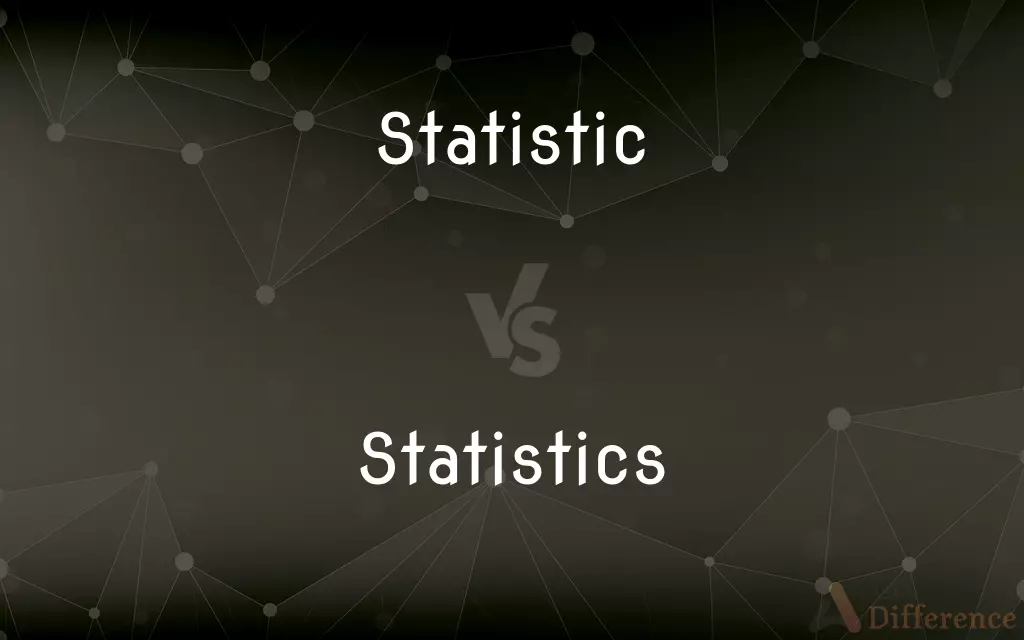Statistic vs. Statistics — What's the Difference?
By Tayyaba Rehman — Updated on August 18, 2023
A statistic is a single measure or data point. Statistics refers to the collection, analysis, interpretation, and presentation of data.

Difference Between Statistic and Statistics
Table of Contents
ADVERTISEMENT
Key Differences
A statistic is singular in nature. When you refer to a statistic, you are often speaking about a specific piece of data or a particular numerical fact. Statistics, on the other hand, is a plural term and is used to describe the entire field of study related to collecting, analyzing, and interpreting sets of data. It encompasses various methods, tools, and theories that are employed to make sense out of numbers and patterns in data.
Tayyaba Rehman
Aug 18, 2023
Another way to think about the difference between a statistic and statistics is by considering the broader picture. If you have a set of numbers, each individual number can be a statistic. But when you collate all these numbers, analyze them, and derive meaningful insights, you are dealing with statistics.
Tayyaba Rehman
Aug 18, 2023
Furthermore, a statistic can be seen as a piece of a puzzle, while statistics is the entire puzzle put together. If you state that the average height of students in a class is 5'6", that's a statistic. But if you compile all the height data, analyze variations, and identify patterns, you are working with statistics.
Tayyaba Rehman
Aug 18, 2023
Comparison Chart
ADVERTISEMENT
Context
One specific piece of information
Entire field of data collection and analysis
Tayyaba Rehman
Aug 18, 2023
Application
Individual data used to represent a fact
Methods used to analyze and interpret data
Tayyaba Rehman
Aug 18, 2023
Usage Example
"The median age is 25."
"The statistics show a rising trend in sales."
Tayyaba Rehman
Aug 18, 2023
Definitions
Statistic
A statistic (singular) or sample statistic is any quantity computed from values in a sample which is considered for a statistical purpose. Statistical purposes include estimating a population parameter, describing a sample, or evaluating a hypothesis.
Tayyaba Rehman
Feb 02, 2019
Statistics
The study of collecting, analyzing, and interpreting data.
She has a degree in statistics.
Tayyaba Rehman
Aug 18, 2023
ADVERTISEMENT
Statistic
A single numerical fact or datum.
The statistic indicates 70% of people like chocolate.
Tayyaba Rehman
Aug 18, 2023
Statistics
Numerical data gathered for analysis.
The statistics from the survey were eye-opening.
Tayyaba Rehman
Aug 18, 2023
Statistic
A measured value representing a particular attribute.
The exam’s pass rate is an important statistic.
Tayyaba Rehman
Aug 18, 2023
Statistics
A collection of quantitative information.
According to the latest statistics, unemployment is down.
Tayyaba Rehman
Aug 18, 2023
Statistic
A numerical fact used to draw inferences.
The most surprising statistic was the dropout rate.
Tayyaba Rehman
Aug 18, 2023
Statistics
The branch of mathematics dealing with data.
He found statistics challenging but rewarding.
Tayyaba Rehman
Aug 18, 2023
Statistic
A fact or piece of data obtained from a study of a large quantity of numerical data
The statistics show that the crime rate has increased
Tayyaba Rehman
Feb 02, 2019
Statistics
Aggregated data points used for analysis.
The statistics indicate a pattern of growth.
Tayyaba Rehman
Aug 18, 2023
Statistic
A specific piece of quantitative information.
The average score, a useful statistic, was 85 out of 100.
Tayyaba Rehman
Aug 18, 2023
Statistics
Statistics is the discipline that concerns the collection, organization, analysis, interpretation, and presentation of data. In applying statistics to a scientific, industrial, or social problem, it is conventional to begin with a statistical population or a statistical model to be studied.
Tayyaba Rehman
Feb 02, 2019
Statistics
The practice or science of collecting and analysing numerical data in large quantities, especially for the purpose of inferring proportions in a whole from those in a representative sample.
Tayyaba Rehman
Feb 02, 2019
Statistics
(used with a sing. verb) The mathematics of the collection, organization, and interpretation of numerical data, especially the analysis of population characteristics by inference from sampling.
Tayyaba Rehman
Feb 02, 2019
Statistic
A calculated numerical value (such as the sample mean) that characterizes some aspect of a sample set of data, and that is often meant to estimate the true value of a corresponding parameter (such as the population mean) in an underlying population.
Tayyaba Rehman
Feb 02, 2019
Statistic
A person, or personal event, reduced to being an item of statistical information.
By dying from an overdose, he became just another statistic.
Tayyaba Rehman
Feb 02, 2019
Statistics
A discipline, principally within applied mathematics, concerned with the systematic study of the collection, presentation, analysis, and interpretation of data.
Statistics is the only mathematical field required for many social sciences.
Tayyaba Rehman
Feb 02, 2019
Statistic
A singular data point derived from a larger data set.
One striking statistic was the 10% increase in sales.
Tayyaba Rehman
Aug 18, 2023
Statistics
The science which has to do with the collection, classification, and analysis of facts of a numerical nature regarding any topic.
Tayyaba Rehman
Feb 02, 2019
Statistic
One viewed solely as a piece of statistical or numerical information
Got laid off and became another statistic in the slumping economy.
Tayyaba Rehman
Feb 02, 2019
Statistics
The branch of mathematics which studies methods for the calculation of probabilities.
Tayyaba Rehman
Feb 02, 2019
Statistics
A branch of applied mathematics concerned with the collection and interpretation of quantitative data and the use of probability theory to estimate population parameters
Tayyaba Rehman
Feb 02, 2019
Statistic
A quantity calculated from the data in a sample, which characterises an important aspect in the sample (such as mean or standard deviation).
Tayyaba Rehman
Feb 02, 2019
Statistic
Of or pertaining to statistics; as, statistical knowledge; statistical tabulation.
Tayyaba Rehman
Feb 02, 2019
FAQs
Can the word "statistic" be used in place of "statistics"?
No, "statistic" refers to a single piece of data, while "statistics" refers to multiple data points or the entire study of data.
Tayyaba Rehman
Aug 18, 2023
How is the word "statistic" commonly used in sentences?
"Statistic" is often used to cite a specific piece of data, like "A recent statistic shows that 60% of voters support the bill."
Tayyaba Rehman
Aug 18, 2023
Are statistics always accurate?
While statistics are based on data, their accuracy can depend on the methodology, sample size, and other factors.
Tayyaba Rehman
Aug 18, 2023
What is a statistic?
A statistic is a single data point or numerical fact derived from a study or survey.
Tayyaba Rehman
Aug 18, 2023
Can a study have only one statistic?
While possible, most studies provide multiple statistics to give a comprehensive view.
Tayyaba Rehman
Aug 18, 2023
Do I need to study statistics to understand a statistic?
Not necessarily. While understanding statistics can provide context, a statistic on its own is just a singular piece of information.
Tayyaba Rehman
Aug 18, 2023
How is statistics different from a statistic?
Statistics refers to the entire field of collecting, analyzing, and interpreting sets of data, whereas a statistic is a singular piece of that data.
Tayyaba Rehman
Aug 18, 2023
How are statistics used in everyday life?
Statistics are used to make informed decisions, understand trends, and interpret data in various fields like economics, medicine, and social sciences.
Tayyaba Rehman
Aug 18, 2023
Is "statistic" only related to numbers?
Primarily, yes. A statistic represents a specific numerical fact or piece of data.
Tayyaba Rehman
Aug 18, 2023
Why is the field called "statistics" and not "statistic"?
Because "statistics" encompasses the collection, analysis, and interpretation of multiple data points, not just one.
Tayyaba Rehman
Aug 18, 2023
Author Spotlight

Written by
Tayyaba RehmanTayyaba Rehman is a distinguished writer, currently serving as a primary contributor to askdifference.com. As a researcher in semantics and etymology, Tayyaba's passion for the complexity of languages and their distinctions has found a perfect home on the platform. Tayyaba delves into the intricacies of language, distinguishing between commonly confused words and phrases, thereby providing clarity for readers worldwide.

















































